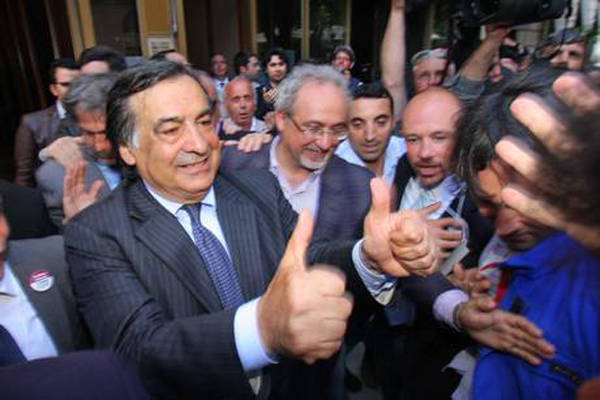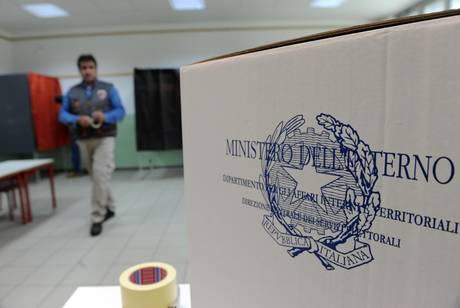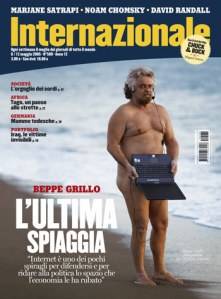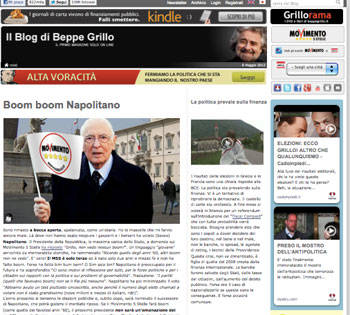Elections in Italy: Harbinger or Swan Song?
ROME – When most of the votes for new local administrations were counted on Tuesday, the question became whether the results foretell the future for Italy or are singing the swan song of its ailing second republic. If they are a reliable prediction of the national general elections scheduled for mid-2013 (although a few right-wing politicos still hope to anticipate these to October), what could follow is a Greek-style melt-down, according to Corriere della Sera columnist Massimo Franco.
But at the same time, if they are a swan song to the politics of the past two decades, they give the Italian political leadership time to reorganize and rethink. Even on the right, some commentators today acknowledge that those for the past few decades have utterly failed to create a political class for the big towns and small villages throughout Italy with just that – class. "I hope the parties will reflect on this," was the lapidary comment of Italian President Giorgio Napolitano.
Whatever the interpretations, with one-fifth of the electorate called to vote, the elections Sunday and Monday amounted to a serious sampler. Although its success on the local level is not yet comparable to that of the Socialist sweep in France, the Center-Left, led by the Partito Democratico (PD), but with outside support, fared better than any other coalition. Silvio Berlusconi's Liberty party (PdL), dropping some 10% of its support across the board, appears in serious melt-down. The scandal-ridden Northern League, where the leaders are at war, seems to be sinking like a stone in its heartland of Lombardy, though not in the Veneto. There Flavio Tosi, 42, was re-elected mayor of Verona, positioning himself as a possible future leader of the entire League - a reward for his successfully distancing himself from the "Magic Circle" who fiddled the League finances under the distracted eye of League founder Umberto Bossi.
As predicted, the political preacher and former comedian Beppe Grillo and his protest party, the Movimento Cinque Stelle (Five Star Movement), which campaigned with countless small-town personal blitzes by Grillo and everywhere by electronic tweet, did a star turn. In some small Northern towns Grillo copped up to 15%. In Monza, where the Center-left took first place with over 38% of the vote, Grillo won 9.7%, placing him in an almost neck-to-neck race against the Northern League, which bested him if barely with 11.2%.
Although some of its supporters were elected, the Catholic center headed by Pier Ferdinando Casini and flanked by Gianfranco Fini failed dismally, suggesting that this is more a part of the past than the future. "I am extremely worried," Casini acknowledged Tuesday. Most fortunately, there were no signs of a revived neo-Fascist organization, like the neo-Nazi party that emerged in Greece.
Abstentions were almost as high as predicted. Of the 7.5 million potential voters, the turnout was of 5 million, or 67%, versus the almost 74% who voted in 2007. In the 27 townships counted at this writing, the turnout was of 58%, eight percent below the turnout of 2007. The sharpest decline in voting was in the North; even in the Ligurian coastal cities of Genoa and La Spezia, which vaunt a strong democratic tradition, only 56% bothered to vote.
The anti-austerity vote in Greece, in particular, does not augur well. There is little doubt that the austerity measures being taken are unpopular in Italy as well as in Greece. But so far Italy's was, all in all, a vote for moderation rather than an extreme rejection of government action. And this suggests that, under the economic circumstances, the Italian politicians showed considerable wisdom last November by turning over the reins of government to an a-political cabinet of professional economists. On the other hand, should the center-right decide to turn Premier Mario Monti into a scapegoat for what is undeniably an election debacle for Berlusconi, the question is whether the PdL will withdraw from it their crucial support in Parliament, so as to reposition themselves as an aggressive outsider in hopes of out-Grilling outsider Beppe Grillo. So far there seem to be no signs of this, but it is early to know what the future will bring.
In Palermo, Leoluca Orlando, 64, who had been the city's mayor back in 1993, was re-elected on a ticket backed by Italia dei Valori, the independent leftist party of Antonio Di Pietro, and pro-environmentalist groups. Topping the list with over 43% of the vote, he was head and shoulders in front of all the other groups, including the candidates from both Center-left (18%) and the Center-right (12.5%).
The Center-left, however, forged ahead in Genoa (48.3%), L'Aquila (40.7%), Parma (40%), Taranto (49.5%), Como (35%). In all these cities the runners-up were significantly below. The electorate in Cuneo was more divided, however, with 36% voting for the "Centro" (center) versus 30% for the center-left, and Grillo claiming 8.4% of that vote.





































i-Italy
Facebook
Google+
This work may not be reproduced, in whole or in part, without prior written permission.
Questo lavoro non può essere riprodotto, in tutto o in parte, senza permesso scritto.